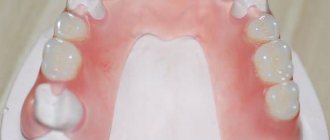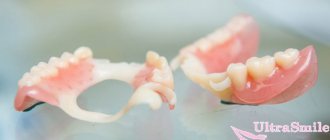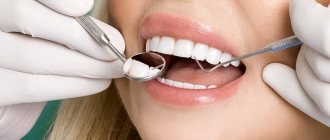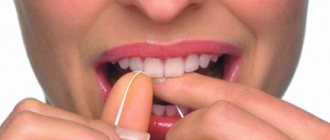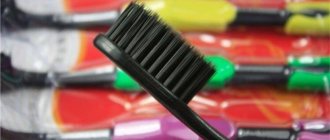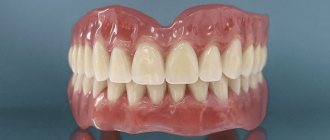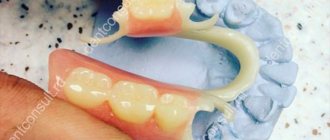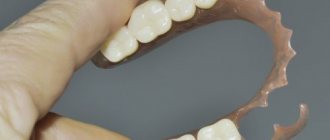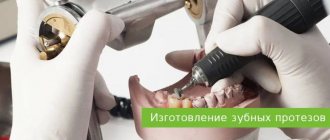During the period when dental implantology is actively gaining momentum, there were, are and probably will remain people who choose removable prosthetics. There are many reasons for this phenomenon, but the most important is the financial affordability of removable dentures compared to products attached to implants. Judge for yourself: the cost of installing a nylon plate prosthesis in Moscow is on average 16 thousand rubles for a design for 1-2 units and 35 thousand rubles for a product for the entire jaw. While the price for one implant prosthesis with a crown starts from 35-40 thousand rubles.
In the recent past, dental prostheses were made exclusively from acrylate mass. It gave the structure the necessary strength and evenly distributed the chewing load throughout the jaw. However, over time, it became clear that for some people such orthopedic products cause more suffering than benefit. For example, it was discovered that acrylic can cause an allergic reaction, and the increased hardness of the denture base strongly rubs the alveolar ridge. In addition, the aesthetics of the gingival margin of the prosthesis were not satisfactory. It is for this reason that dentists continued to search for a more acceptable material for removable orthopedic structures. The attempts were successful, and several decades ago scientists created a fibrous polymer material that met all the requirements for removable orthopedic structures. It had sufficient strength and at the same time flexibility, did not emit toxic substances and had higher aesthetic characteristics. Thanks to the translucent structure, nylon is not so noticeable in the oral cavity, and the gums have a more natural appearance.
What is a nylon prosthesis
Removable nylon dentures are soft orthopedic structures made of a pink, gum-colored nylon base with invisible clasps that hold it in the mouth. The fixation is on the adjacent teeth; the hooks wrap around the supports, keeping the prosthesis stationary on the jaw. Artificial crowns are placed on an elastic frame.
A person can take off and put on a nylon prosthesis without assistance. They are used in dentistry as a temporary solution during implantation (during the process of osseointegration) or as a permanent prosthesis according to indications.
Nylon is a polymer that has the quality of flexibility, and under certain conditions, in the patient’s mouth, softness increases. As a denture material, it has come as an alternative to dental acrylic, to which some people are allergic.
Partial nylon prosthesis RUR 40,000. for all!
The price includes: diagnostics, impressions, manufacturing, installation, fitting and 1 year warranty! Complete denture Akrifri 1 jaw - 47,000 rub.!
Delivery areas:
- Altufyevo
- Bibirevo
- Biryulyovo East
- Central Administrative District
- Chertanovo
- Golyanovo
- Krasnopresnenskaya
- Kuntsevo
- Kuzminki
- Odintsovo
- Lyublino
- Medvedkovo
- Mitino
- Otradnoe
- Pavshinskaya floodplain
- Printers
- Polezhaevskaya
- River Station
- Ryazan Avenue
- SAO
- Northern Butovo
- Sokolniki
- NEAD
- SZAO
- Tushino
- Southern Administrative District
- SEAD
- South-Western Administrative District
- Voikovskaya
- Vykhino
- Company
- Zhulebino
- Aprelevka
- Dubki
- Krasnoznamensk
- Krylatskoe
- Cuban
- Nazaryevo
- Barvikha
- Vlasikha
- VNIISSOK
- Vnukovo
- Larks
Stages of manufacturing a flexible prosthesis
To create nylon dentures, you must first treat the teeth, perform removal according to indications, and then proceed to the following steps:
- taking impressions of jaws in a clinical setting;
- plaster models are made in the laboratory;
- a wax prototype of the prosthesis is cast, tried on, and finalized;
- a nylon final version is created, matched to the color of the gum. The equipment used is a heat press, in which polymer granules are melted and an individual mold is poured in a liquid state. After hardening, the structure is polished.
Clasps are a continuation of nylon dentures and are therefore completely invisible on the jaw even when smiling and talking.
How much will prosthetics cost?
Prosthetics usually take place in several appointments with a doctor. During the first visit, the patient will have a consultation with an orthopedist and a dental technician, diagnostics, history taking and impressions taken for the manufacture of an individual prosthesis. These services are not included in the cost of the prosthesis and are paid additionally. At the next appointment, the manufactured structure is tried on and adjusted, and recommendations for its care are received.
The price of a denture made of nylon is higher than its analogue made of plastic. Partial replacement of missing teeth in Moscow will cost about 15,000 - 20,000 rubles, complete replacement - about 50,000 rubles. Please note that clinics provide different warranty periods for finished structures. Choose the option that seems most suitable to you.
Indications for installation
Indications for removable nylon dentures can be:
- loss of one or more teeth in a row;
- scattered defect;
- absence of all teeth;
- allergy to metal, acrylic;
- if you do not want to grind the supporting teeth for dentures, for example, clasp ones with locks;
- periodontal disease of 1st and 2nd degrees to keep teeth in place (but 3.4 degrees will already be a contraindication);
- patient refusal or medical contraindications to implantation;
- childhood, if necessary, hide early tooth loss;
- as a temporary solution for implantation with delayed loading.
Sometimes nylon dentures can be installed to treat bruxism, involuntary grinding in the mouth, which damages tooth enamel and increases wear. And also for athletes and people involved in traumatic sports, a flexible design is the best option, better than acrylic, which can easily break in case of injury.
What material is it made from?
The most important characteristics of removable structures, such as secure fixation, wearing comfort and aesthetics, are determined by the materials from which these structures are made.
Plastic
Acrylic plastic is used to make plastic dentures. This option can be used for both complete and partial edentia.
The prosthesis is secured using the “suction effect”. The patient bites down on the denture, excess air comes out of it, and a tight fit to the gum is ensured.
Acrylic
The most popular and affordable dentures are acrylic. Used to restore partially lost teeth.
Pros:
- low cost;
- ease of manufacture and operation;
- good aesthetics - acrylic does not change its properties over time, and is not stained by coffee, tea or cigarettes.
Reviews of acrylic dentures are generally good, except for the possibility of allergies, which is why some patients remove them at night.
The photo shows an acrylic prosthesis
Nylon
Soft dentures are made from elastic nylon. They can be used for both partial and complete absence of teeth.
The positive aspects of nylon prostheses are:
- good level of elasticity;
- they are thinner and lighter compared to other materials;
- high flexibility.
These properties increase wearing comfort. However, this material has more negative aspects than positive ones. Firstly, the healing of the structure: due to the soft elastic nylon, the gums are greatly deformed, so bone resorption may even occur. Secondly, chewing food is often accompanied by pain. Finally, nylon dentures have to be adjusted frequently.
The photo shows a nylon prosthesis
Аcryfree
Acri-free - modern nylon prostheses. This material was first developed by an Israeli company. They occupy an intermediate position between plastic and nylon structures, incorporating their best qualities. Such structures are made from advanced acrylic plastic. They have a slightly greater degree of flexibility than acrylic ones.
Among the advantages they note:
- high aesthetic properties;
- wearing comfort;
- almost invisible thanks to the translucent material.
The photo shows an AcryFree nylon prosthesis
Spofadent
A new version of dentures, which includes three-layer plastic, which gives Spofadent dentures high strength. The material shows high aesthetic properties: it can be easily painted in various shades of pink and white. Dentures made from Spofadent are practically not exposed to chemicals contained in soda, drinks and food. Like Acryfree, this material is translucent, so it is excellent for prosthetics of front teeth.
Ivobase
It is an organic thermoplastic material, the chemical name of which is polymethyl methacrylate. The manufacturing technology of this material itself makes it possible to reduce allergic reactions and eliminate errors when installing dentures (overbite or excessive shrinkage).
Moreover, structures made from Ivobase have increased strength and low porosity, so the material is not stained by pigments contained in food and is slightly susceptible to bacterial attack. Such prostheses have high biocompatibility, quality and wearing comfort.
Vertex
Vertex is a modern thermoplastic material that is manufactured without the use of monomers, which ensures the absence of allergies, burning and itching when worn. Patients do not experience a feeling of dryness, articulation and taste perception are not impaired when using prostheses from Vertex. This material is stronger than other plastic structures, so manufacturers can make the base as thin as possible. You can choose shades of white and pink for each specific occasion. The material has good properties and is therefore suitable for full and partial prosthetics.
The photo shows the Vertex prosthesis
Deflex
The material comes from Argentina. It contains modern innovative thermoplastic polyamide. The base of such dentures is made completely transparent, and if desired, you can give it a pink tint. Such dentures are more flexible and durable than acrylic structures. They are recommended for police officers, firefighters, boxing athletes and other people with traumatic professions. However, this material has several disadvantages:
- ability to absorb odors;
- inability to repair the prosthesis.
Deflex is recommended for use only for partial dentures. However, if other teeth are lost, the entire prosthesis will have to be redone.
The photo shows the Deflex prosthesis
Contraindications
What may be a contraindication to a nylon prosthesis in dentistry:
- periodontal diseases (grade 3-4 periodontal disease), loose teeth, their displacement;
- recession;
- the height of the supporting teeth is not enough, the clasps will not be able to securely fasten;
- inflammatory processes of the mucous membrane and gums;
- tooth mobility;
- significant bone atrophy.
It is necessary to have healthy teeth on both sides of the prosthesis as supports for clasp fixation.
Varieties
There are:
- mini dentures for 1-2 teeth;
- partial (in the absence of three or more teeth);
- complete (replacing the dentition of the entire jaw).
Many people mistakenly believe that all flexible prostheses are nylon. This is wrong. They are very similar to the touch and in some characteristics. However, they should be considered separately.
Quadrotti prosthesis
A special modern type of prosthesis, which stands somewhere between clasp and nylon. It is more durable than the latter, has a little flexibility, and the fasteners are also not visible, unlike the clasp design, where, perhaps, this is the only drawback. The material of manufacture is monomer-free plastic.
Immediate prosthesis “butterfly”.
This is just a type of nylon prosthesis. It is used in cases where one, or less often, two teeth are missing. Small design, good replacement for a lost dental element. Produced quickly. The supporting teeth are not affected, that is, the doctor does not grind them down, they remain healthy and serve their term.
Reviews
— Albert
I really liked the level of service and attitude of the staff.
- Eugene
They saved me, there’s no other way to put it. Thank you for the speed and decency. Everything as promised!! I recommend to all!!!
- Svetlana
This is not the first time we have used denture repair services. As always FAST AND HIGH QUALITY! Thank you for your promptness and understanding!!
— Ksenia Vladimirovna
My daughter’s denture broke on the eve of her wedding, I was very upset, but Denta-Labor managed to fix it very quickly and efficiently, thank you.
Rules of care and wearing features
In order for the prosthesis to look aesthetically pleasing throughout the entire period of use, you should adhere to simple rules for caring for it:
- brush your teeth and teeth 2 times a day;
- the toothbrush should have soft bristles and the toothpaste should be non-abrasive;
- After each meal, also clean the product or rinse your mouth with water if it is not possible to remove and thoroughly wash the denture;
- take it to the dentist for professional cleaning twice a year;
- do not store in a dry place;
- periodically use a special solution to disinfect and clean removable dentures.
How to care
As practice has shown, people with soft removable dentures do not know how to clean them. They often use everything from soap and water to toothpastes, whiteners and commercial products. The amount of inconsistent and often unproven advice found on the internet is alarming. At the same time, improper care can pose a real threat to both the oral health and the overall health of the user.
We have prepared some recommendations for you from recognized experts from the Netherlands, Belgium, Switzerland, Japan and the UK.
To prevent any oral health problems associated with poor care, they advise:
- Clean your dentures daily with a non-abrasive cleanser (not toothpaste) and a soft brush.
- Soak it daily overnight in a special disinfectant detergent. This will not only eliminate bacteria, but will also prevent drying out and help maintain its shape.
- Get regular dental exams so your doctor can check your overall oral health.
To remove stains from the product, soak the dentures for 8 hours in a solution containing 1 part vinegar and 9 parts water. For a more intensive cleaning, mix 1 part vinegar with 1 part water and let sit for 10-30 minutes. Discuss any questions you have with your dentist!
Advantages
An undoubted advantage is the aesthetic appearance, better than that of acrylic and clasp structures. And:
- light weight, which is a significant factor for the upper jaw, where a person feels every gram of a foreign body;
- small basis. There is no wide part blocking the sky, like the plate analogue, which is much more comfortable;
- quick addiction is due to the two points above;
- “invisible prosthesis”, invisible to others, a person can laugh and talk without hesitation. Nylon, in this sense, is a good material; it perfectly imitates gums. And since the clasps are a continuation of the base and are of the same color, they are attached directly to the gums behind the supporting tooth, so they are not visible. What is an advantage over metal visible hooks of clasp structures and acrylic ones;
- hypoallergenic. The production does not use toxic monomers that are added to the plastic mass of acrylic prostheses. They are the ones who cause allergies in patients. By the way, other alternatives to prosthetics have appeared for such sensitive people - Acry Free;
- there is no metallic taste in the mouth due to the absence of metal in the composition;
- The next plus will be felt by people who have a small mouth. Opening it wide to install a large prosthesis is not very comfortable. But not in this case. Nylon bends easily and does not require such sacrifices from patients.
Flaws
It cannot be said that all the disadvantages that we describe below apply to mini-prostheses. They are the ones who receive the least number of complaints. But larger designs definitely have the following negative nuances:
- uneven load when chewing and discomfort when chewing food. The base is flexible and when bitten it bends even more, all the pressure goes to one area, which causes pain. Since the load is not distributed over the entire prosthetic bed, the tissues underneath it atrophy;
- rapid atrophy. Under any removable denture this process occurs and the height of the alveolar ridge is lost. You can find figures about 1mm per year. Loss of tissue leads to subsidence of the prosthesis;
- damage to the gums in the area of clamp fixation. Unlike the clasp type and the plate type, where the hooks wrap around the neck of the supporting tooth, nylon dentures have a gingival attachment. Therefore, the load when chewing is transferred not to the tooth, but to the gum, which over time injures it;
- a fairly rapid decline in aesthetics. Nylon scratches, becomes sticky over time, and attracts dirt;
- beyond repair;
- short service life - up to 5 years and at the same time the need for frequent corrections.
Service life of a removable soft nylon prosthesis
It is worth noting that the service life lasts up to 7 years with proper care ! This means regular cleaning with a soft brush and rinsing with special soluble tablets, for example, Corega. But do not forget that over time, dentures require adjustment or complete replacement due to age-related changes in the relief of the oral mucosa.
You can find out more about the types and costs of dental prosthetics at the Art Dental clinic here.
The Art Dental clinic provides a whole range of dental services, including removable dentures, performed at a high level and in accordance with the budgetary capabilities of patients.
Expert opinion
Roman Borisovich Alekperov
orthopedic dentist
Experience: 24 years
The choice of flexible prostheses is based mainly on the patient’s desire to receive maximum comfort from wearing an orthopedic structure. Nylon or silicone prostheses do not require long-term adaptation - made from an individual cast, they immediately sit comfortably and allow you to chew food and speak normally. It is important to remember that long-term wearing of flexible prostheses can lead to the development of atrophic processes in bone tissue, since these structures do not have a rigid base. Do not use flexible dentures for more than 6-9 months if you are planning to have implants. If such a situation occurs and the bone is “gone,” it will be necessary to pre-build it or perform basal implantation.
Kinds
Among the variety of prostheses, they are divided into:
- partially removable;
- completely removable structures;
- conditionally removable.
Fully removable systems are most often used for complete tooth loss. They are created from individual casts, taking into account all the anatomical features and structure of the patient’s jaw.
They are made to be as comfortable as possible and the recommendation is not to take them off at all for the first time. During the test period of wear, the body gets used to it, and the doctor monitors the patient’s reaction to the prosthetics.
If necessary, the dentist makes adjustments and adjusts the design of the prosthesis, which makes wearing them more comfortable and painless. This type of removable denture looks very natural. They are made from the following materials: nylon, plastic. Please note that the structures are non-toxic and do not cause harm to health.
Conditionally removable dentures are recommended for the loss of one tooth. Such medical systems do not need to be removed before going to bed. They are attached to adjacent teeth using special cement; metal hooks and glue are also used for fastening.
Partially removable types of structures are not the most convenient. They attach to the gums and take up a lot of space in the mouth. This option is suitable for permanent wear, on a temporary basis and can replace one or more teeth. The technology is not perfect, but its financial accessibility makes it popular today.
Examples of work “Before” and “After”
Partial restoration of teeth on both jaws
Case: partial absence of teeth on both jaws.
Complete prosthetics of the upper and lower jaws
Case: absence of teeth in the upper jaw (completely), absence of an orthopedic structure in the lower jaw on existing implants (installed in the USA two years earlier) Work: production of a complete removable denture in the upper jaw as a temporary structure until the installation of one-stage implants with subsequent prosthetics.
Installation of plate dentures with complete edentia (April 2012)
Case: complete absence of teeth in the upper and lower jaws, weak fixation of the removable denture in the lower jaw.
Complete absence of teeth in the upper jaw
Case: Completely edentulous upper jaw Work: Complete removable plate denture - acrylic Number of visits: 4 Time: 2 weeks Cost: 25,000 rub.
Indications for soft dentures
- complete edentia of one or two jaws;
- partial loss of teeth, absence of individual units in different parts of the row;
- the patient’s desire to undergo prosthetics without preparing the lateral supporting units;
- during the manufacture of permanent structures;
- in case of allergic reactions to other materials used to restore missing teeth;
- if the patient’s hobby or professional activity is associated with a high risk of injury.
Often, soft nylon prostheses are chosen by athletes whose activities are associated with the possibility of injury and the risks of installing permanent, ceramic or metal-ceramic structures. In addition, flexible products are indicated for advanced forms of periodontal disease, the absence of end elements of a row, or when it is impossible to use other types of dentures.

